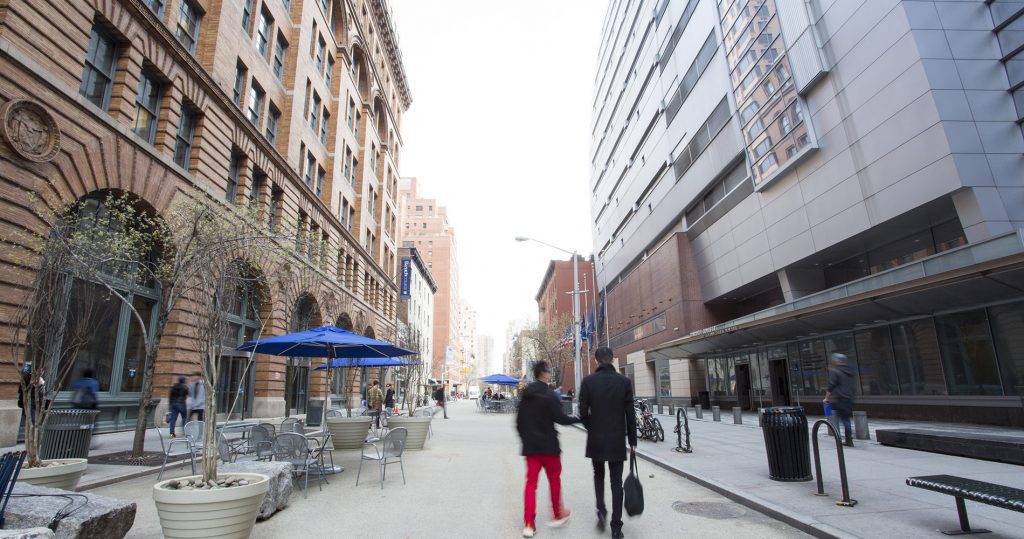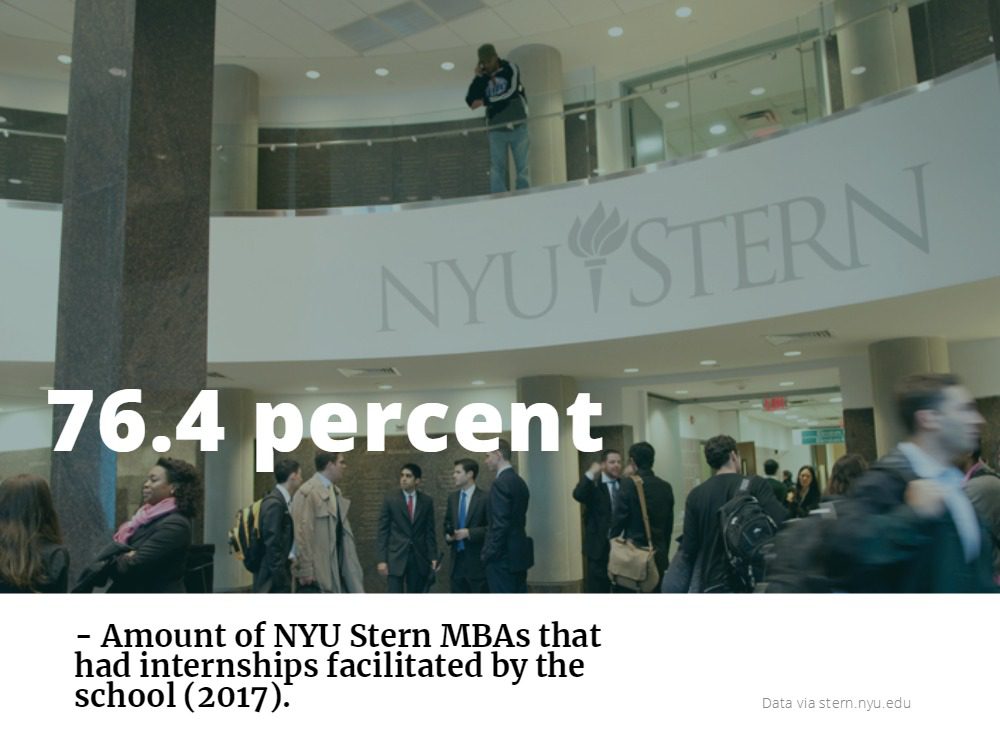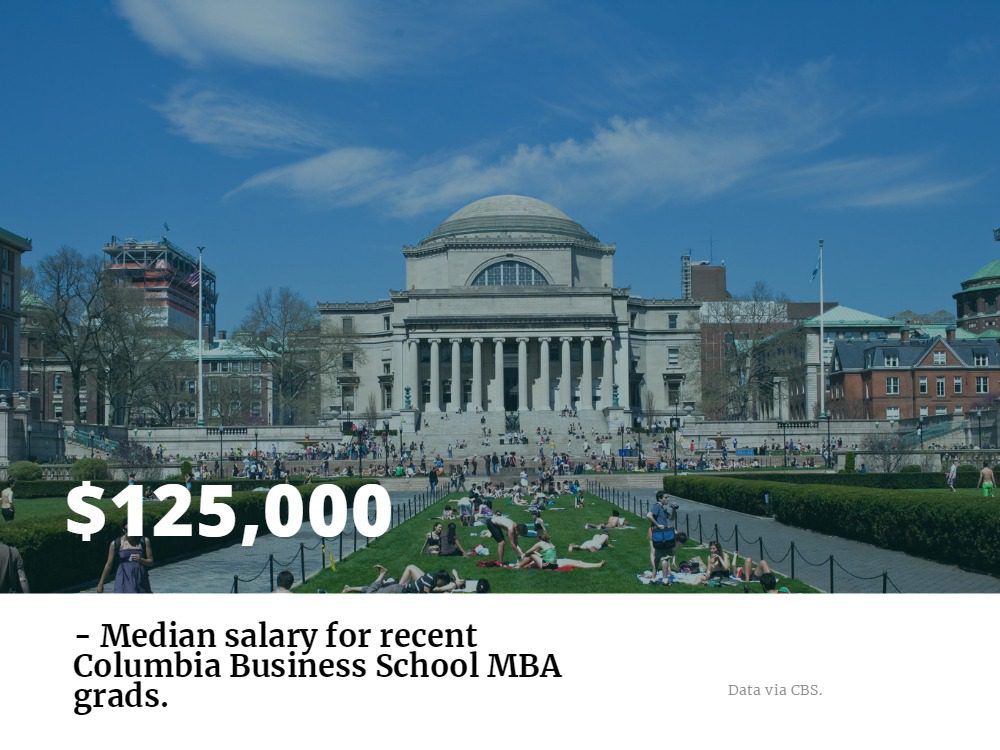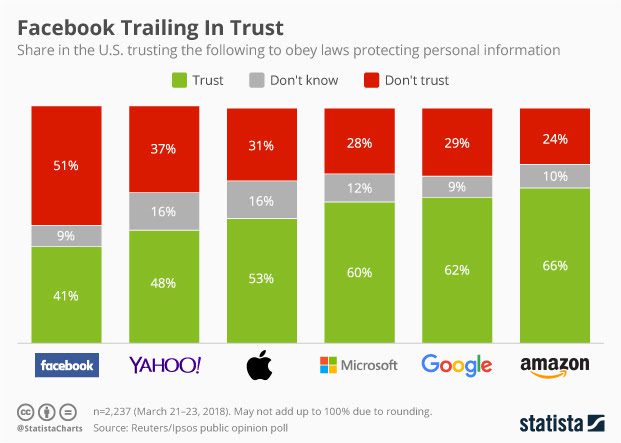Forced Good Behavior Isn’t Good, According to Columbia – New York News

Let’s explore some of the most interesting stories that have emerged from New York City business schools this week.
Columbia Business School: Mandated Corporate Good Behavior Hurts Bottom Line & Reduces Efforts to “Do Good” – CBS Newsroom
New research from Columbia Business School professor Shivaram Rajgopal finds that mandatory Corporate Social Responsibility as a business practice is a “value-decreasing proposition for shareholders, and a disincentive for corporate good behavior.”
Raigopal writes, “Our findings prove that CSR is counterproductive when governments get involved. In developing an effective method for measuring CSR’s impact on business we were able to prove that CSR only has value if it is a voluntary activity. Shareholder value decreases as mandatory CSR increases. In fact, mandatory CSR is, in effect, nothing more than an inefficient backdoor tax on private sector.”
You can read more about Raigopal’s research here.
Introduction of Craigslist Increased Prostitution Across U.S. – Experience Stern
New research from NYU Stern School of Business and the University of Minnesota’s Carlson School of Management finds that “as Craigslist expanded across the United States, the free classifieds website also bolstered the sex industry,” which co-author Anindya Ghose, the Heinz Riehl Professor of Business at the Stern School, explains is “made up of both independent sex workers and workers operating under commercial vice groups.” In fact, Craigslist’s entry into a county increased prostitution cases—both “transactions by existing sex workers, as well as prompted recruitment and coercion of new ones”—by 17.58 percent.
The data was revealed in the recently-released study “The Digital Sin City: An Empirical Study of Craigslist’s Impact on Prostitution Trends”, which was “based on analysis of national panel data for 1,796 U.S. counties from 1999 to 2008.”
You can read more about the study here.
Lonely and Non-Empathetic People More Likely to Make Unethical Shopping Decisions – Binghamton SOM
New research from Binghamton SOM assistant professor of marketing Jenny Jiao finds that lonely consumers “very often behave immorally. And while these behaviors are often legal, they are unethical and cost retailers billions each year.”
She cites the common example of ‘wardrobing’ in which “someone may buy a big-screen TV for Super Bowl Sunday, only to return it on Monday; or they may buy a nice outfit for a night out, only to return it the next day.”
In Jiao’s paper, “Can Lonely People Behave Morally? The Joint Influence of Loneliness and Empathy on Moral Identity,” which was recently published in the Journal of Consumer Psychology, she was interested in how much of a factor loneliness played in this type of consumer behavior.
“We found that lonely people are capable of empathizing and making moral decisions, but they may not have the intention or motivation to. But when empathy levels increase, we don’t see much difference between lonely people and non-lonely people. Lonely people will be more likely to engage in moral behaviors and less likely to engage in immoral behaviors when they feel empathy.”
Read more about Jiao’s research here.
Orientation: NYU Stern One-Year MBA Programs in Tech, Fashion

As it prepares to welcome students for orientation next week, NYU Stern School of Business has shared preliminary class profiles for its two new specialized one-year MBA programs—the Andre Koo Tech MBA and the Fashion & Luxury MBA. Stern announced the launch of the new May-to-May programs one year ago. The inaugural classes will each be made up of approximately 30 students.
Though designed for students from different backgrounds targeting diverse post-MBA career paths, the two programs do share several things in common. Each pairs traditional core curricula and specialty and elective courses with real-world projects to provide hands-on experience for students interested in careers within tech/entrepreneurship and fashion/luxury industries. They also “represent a new category of MBA and have been developed in partnership with the business community to address a talent gap,” the school notes.
Real-World Immersion
Both programs prioritize experiential learning opportunities that connect students and faculty with top companies to address real business issues. Each features two immersion experiences pairing students with companies to work on projects related to consulting, product management, brand strategy, supply chain optimization, and financial forecasting.
As part of their first term, students in the Fashion & Luxury program will participate in visits to New York companies to work on live cases with industry partners. The goal of these, the school notes, is for students to emerge from their summers with a “strong foundation of problem-solving tools.” The Fashion & Luxury program also features a second international immersion in the winter term.
Students in the Andre Koo Tech program will take part in summer term immersions with New York area tech companies. They will then spend their winter terms in the San Francisco Bay area as part of an immersion designed to allow them to explore the West Coast tech ecosystem and work on high-impact projects with Silicon Valley tech companies.
Preliminary Class Profile Highlights
The preliminary class profiles for each program’s incoming Class of 2019 include a wealth of information about student demographics, background, experience, class sizes, and more that offer incoming and prospective students a sneak peek at what to expect.
The incoming class for the Tech MBA program is 42 percent women, making it “comparable to two-year MBA programs with the highest percentages of women,” Stern notes. International students also make up 42 percent of that class. Perhaps most notable, 87 percent of students in the tech-focused MBA program will be entering with previous coding experience, many with skills in multiple programming languages.
Like the Tech MBA, the incoming Fashion & Luxury MBA Class of 2019 is also capped at 30 students in an effort “designed to maximize industry engagement…for high-touch learning and built-in ‘live case studies’ with companies year round,” the school notes. Women make up 88 percent of the incoming class. More than half—54 percent—brings previous experience in consumer products. In terms of undergraduate study, the class includes equal percentages of former business and humanities majors, at 35 percent each.
Incoming Students Share Hopes and Expectations for the Programs
Clear Admit caught up with incoming students in each program to learn more about their backgrounds and what attracted them to the Stern one-year MBA offerings.

Nicole Imbriaco, NYU Stern Tech MBA Class of 2019
Nicole Imbriaco, an incoming student in the tech program, graduated from Rutgers in 2016 with a B.S. in finance and business analytics. She has experience with HTML/CSS and SQL, among other coding languages.
“I believe it will afford me the opportunity to merge my strengths within business and technology and expand my skill set equally within both disciplines,” Imbriaco said. She added that she hopes the specialized MBA degree will facilitate a drastic career pivot, allowing her to focus more intensely on professional interests that have shifted since she graduated from college.
The loss of her mother during her senior year at Rutgers inspired a newfound interest in healthcare, she shared. After graduating from college, she worked at Goldman Sachs, which she says was a valuable experience that helped her redefine her career goals. “Being around some of the most intelligent people I have ever met, I realized I was being drawn towards better utilizing technology within the health/wellness industries,” she shared.
Imbriaco believes the Andre Koo Tech MBA will give her a skill set that she can apply to a variety of industries. She hopes upon completing the program to use “the combination of business, analytics, and technology-focused skills to contribute towards making a difference in the fields of cancer research,” she said.
Incoming Fashion & Luxury Class of 2019 student Christian Trautwein is a 2012 graduate of Brown University with a B.A. in political science. Since graduating he has worked as a merchandise manager with Walmart E-commerce. Trautwein was attracted to the one-year MBA program by the “promise & opportunity” it offers to graduates. NYU’s proximity to the fashion industry was also a draw. “My desire to build a fashion brand paired perfectly with the robust program NYU Stern has built,” he said.
More details about Stern’s new one-year MBA programs, including how to apply, can be found here. In their inaugural application cycles, these programs featured slightly earlier application deadlines than the two-year MBA program, with a September 15th first deadline, a November 15th second deadline, and a January 15 third deadline. Deadlines for the 2018-19 application season have not yet been posted.
This article has been edited and republished with permissions from our sister site, Clear Admit.
New York City’s Work/Life Balance Problems, and More – New York City News

Let’s explore some of the most interesting stories that have emerged from New York City business schools this week.
Would You Like Your Boss to be Fined for Making You Reply to Emails? – NBC News
Lehigh University College of Business and Economics management professor Liuba Belkin’s work was recently cited by NBC News regarding a potential new NYC law that would effectively ban workers from being forced to reply to after-hours emails and other messages. The reason behind the proposed law is that the increasingly common practice in the U.S. is decreasing work-life quality, which was a provincial point of Belin and co-author William J. Becker’s study “Exhausted, but Unable to Disconnect: After-Hours Email, Work-Family Balance and Identification.”
The potential new law would not effectively ban those from sending messages after hours, but being forced to work off-the-clock would be subject to a fine of around $500 for each offense. France, NBC News writes, passed a similar law in 2017 “requiring businesses with 50 or more employees to negotiate after-hours email rules with workers, potentially allowing them to ignore post-work correspondence.”
Human resources manager Steve Wang thinks the lofty comparison to France’s work culture is not as easy in the U.S. The country has stricter labor laws, instituting 35 hour max work weeks, and a law preventing people from working 4.5 hours straight without any breaks, for instance.
Click here to read more about the law and Belin’s study.
What are the Best Healthcare MBAs You Can Find in New York City? – MetroMBA
Four of the best health care MBA programs reside in New York; three of which fall right inside the five boroughs. Columbia Business School, the Zicklin School of Business at Baruch College, the Stern School of Business at NYU, and the SC Johnson Graduate School of Management at Cornell in Ithaca each offer exemplary healthcare management learning options for any hopeful MBAs, some of which are coupled with dual degrees.

Zicklin’s Executive MBA in Healthcare Administration is one of the few programs in the New York metro that has both AACSB and CAHME accreditation.
Find out more about the best healthcare MBAs you can find in New York here.
Daniel A. D’Aniello speaks on the value of mentorship in driving success – Johnson SOM Blog
Cornell University’s SC Johnson Graduate School of Management recently hosted Carlyle Group co-founder and former Marriot VP of Finance and Development Daniel A. D’Aniello at this year’s Lewis H. Durland Memorial Lecture.
D’Aniello used the talk as an opportunity offer invaluable entrepreneurship, stewardship, and mentorship advice to Johnson students from his distinguished career as co-founder of one of the world’s largest investment firms. He also “emphasized the importance of humility in recognizing one’s errors and understanding how to spend one’s time.” He elaborates:
“Allocate your valuable time to things that are going to scale, grow, and become profitable. Time is your highest opportunity cost.”
You can read more highlights from D’Aniello’s talk here.
What is a Summer Internship and Why Should I be Interested?

The idea of an internship may evoke images of coffee runs and paperwork for many business students, but in reality summer internships can be a crucial—and incredibly lucrative—part of every student’s business education and early career.
Around the country and world, top companies open their doors each summer for students interns to gain on-the-job experience, make professional connections, and get a glimpse at what their post-MBA future has in store. Many business schools now even require an internship between a student’s first and second years in their MBA program.
But what really is a summer internship, and why is it seen as so important for MBA students? We take a look at why the summer internship plays such a crucial role for business students, and the ways you can make the most of your experience.
What is a Summer Internship?
Although the idea of internships began as an opportunity for medical students to gain hands-on experience in the field, they can be found today in nearly every industry, organization, and type of institution. From massive corporations to the smallest nonprofit, summer internships have become a key part of both running a business and starting a career. And with the win/win nature of most summer internships, it’s understandable why: the student gets to spend their summer break making connections, gaining experience, and often making money, while the company gets temporary help from someone who just might eventually become a dedicated employee. Because of the invaluable on-the-job skills attained during an internship, many business schools now even require them between a student’s first and second year.
But the reason to get a internship goes beyond the experience that can be gained over the course of a summer or semester: a LinkedIn survey looked at the 3.5 million users with internships in their job history and discovered 600,000 users who returned to those same companies in full-time positions. Furthermore, he industries in the survey that boasted the highest likelihood of an internship becoming a full-time job are well aligned with an MBA’s experience—31 percent of internships in accounting and 25 percent of internships in management consulting became full-time jobs.
Even for those who don’t return to the same company they interned for to work full-time will find that having an internship on their resume speaks volumes for potential employers. With 86 percent of employers looking to hire recent MBA graduates (according to a GMAC survey)—a figure that continues to grow—it’s more important than ever to be able to easily demonstrate your value and experience to prospective employers.
How Do I Find a Summer Internship?
While it’s not impossible for students to venture out on their own and apply directly for internships they want, one of the best parts of being in an MBA program is having the support and resources of the business school behind you. Especially since so many programs now require internships as part of the MBA process, the university has become a crucial part of helping students to find the perfect internship for their interests and career goals.
A quick look at employment reports from a major university like NYU’s Stern School of Business can reveal just how important a school’s career development office can be when it comes to finding that perfect internship. At NYU Stern, 76.4 percent of internship offers accepted by the Class of 2017 were facilitated by the school, compared with just 23.6 percent initiated by the students. And while roughly half of the offers initiated by students came from existing personal contacts, the school facilitated offers came from a variety of different sources. Whether it was on-campus scheduled interviews at the school, job postings, Stern supported activities like clubs and conferences, business school alumni or career fairs, the school was able to lead students to internships in consulting, entrepreneurship, healthcare, media and entertainment, and more.

Why Other Benefits are There to a Summer Internship?
Even if the thought of building a professional network and opening the potential for full-time employment through an internship sound appealing, it’s likely you still have money on the mind. It’s understandable, too, since so much of the discussion surrounding internships today bring one word to mind: unpaid.
It’s certainly true that unpaid internships make up a large portion of the summer internships that are available, and for many students it’s not fiscally possible to lose a summer of working to gain professional experience. Thankfully, business schools understand this and strive to find students internships that will not just fit their career goals but their financial goals as well.
Due to the level of the work and time commitment, most internships for MBAs are paid, and often pay quite well. So no need to sacrifice career growth for summer funds—in fact, the two things go together perfectly! While it varies slightly by industry, summer interns in the Class of 2018 at Northwestern University’s Kellogg School of Management made a monthly average salary of anywhere from $3,500 (nonprofit industry) to $10,734 (consulting).
Summer internships can be a crucial part of the MBA experience, and it’s clear to see why: with the potential of an internship to turn into a full-time job and the financial benefits of the experience, MBAs should be banging down the door for the opportunity. But thankfully they don’t have to. Business schools and their career development offices have made it a priority to get students the internship of their dreams at the salary perfect for their wallets.
A Look At New York’s Best Real Estate MBA Programs

In 2017, the United States Commercial Real Estate Services group (CBRE), listed New York City’s real estate investments markets among the three largest in the world, sandwiched between Tokyo and Los Angeles. This makes New York City the perfect place to learn about the multi-faceted, constantly-evolving field of real estate. For aspiring MBA’s interested in pursuing real estate, we’ve laid out some of the best New York real estate MBA programs the metro has to offer.
The Best New York Real Estate MBA Programs
Columbia Business School
The oft-celebrated Columbia Business School MBA Real Estate Program emphasizes finance and investment management, headquartered at the Paul Milstein Center for Real Estate. There, according to the school, students will gain an education focused on “capital markets, entrepreneurship, and global business.” Since many of Columbia’s alumni remain in New York metro, the school has access to a large network of professionals to engage in speaking events, panels, and mentorship with current students. Students in this program must take Real Estate Finance, which the school considers the Real Estate program entry course. Students then take nine credits of real estate electives.
The Real Estate Private Equity class lets students gain real-world experience. Groups of students work with industry sponsors to develop a business plan and present their final projects to a panel of professionals. Given the hands-on private equity and investment experience provided by this course, it makes sense that in 2017, 46 percent of students who graduated from the MBA Real Estate program went on to careers in Investment Management/Private Equity.
Nearly 4 percent of the most recent MBA class from CBS entered the New York real estate industry, earning a median income of $120,000 per year and, of course, heavy amounts of extra compensation. These graduates earned positions at notable real estate firms, such as: Drake Real Estate Partners, GLL Real Estate Partners, Greystar Real Estate Partners, LLC, Summit Real Estate Group, LLC, TKF Real Estate Investment LLC, and Trilogy Real Estate Management.

SC Johnson Graduate School of Management – Cornell University
At the Cornell University SC Johnson Graduate School of Management, students can pursue a dual degree in real estate and business administration. The MPS in Real Estate/MBA is a collaboration between Cornell SC Johnson’s School of Hotel Administration and Johnson. The dual degree spans six semesters (three years), and includes two summer internships. The first year of the degree is in either the real estate program or the MBA program, but students can take courses in both programs in the following semesters.
Students pursuing real estate at Cornell benefit from access to the the Cornell Real Estate Council, which the school promotes as “one of the largest university-based networks of real estate professionals in the world.”
YOU MAY ALSO LIKE: Finding the Best Real Estate MBAs in Los Angeles
Rutgers Business School, Newark and New Brunswick
The Real Estate Concentration at the Rutgers Business School in Newark and New Brunswick, New Jersey, has several objectives. The curriculum is geared toward arming students with the ability to assess investment risks in real estate markets, determine the best way to utilize a property based on market and demographic information, and gain a thorough knowledge of the legal intricacies involved in real estate. In addition to their elective and core MBA courses, b-schoolers with a real estate concentration are required to take the following courses: Aggregate Economic Analysis, Real Estate Development, Real Estate Law, and Real Estate Finance.
Stern School of Business – New York University
Any discussions of the best business schools in New York metro, and perhaps the world, are likely to include mention of the NYU Stern School of Business. Stern’s MBA with a Real Estate Specialization helps students understand the intricacies of real estate markets, financing real estate projects, real estate development, and managing real estate investments. The curriculum includes courses like: Real Estate Development and Entrepreneurship, Urban Systems, and Real Estate Investment Strategies.
One major perk of Stern’s program is its flexibility; Stern MBA’s can select up to three specializations, so students are not limited by their choice. Real estate is a vast field, with a multitude of facets. MBA’s interested in New York real estate might choose a secondary specialization to complement their specific interests, such as entrepreneurship and innovation or marketing.
What They’re Saying: The Facebook Fallout

It seems puzzling to say a company that is worth nearly half a trillion dollars is venturing somewhere near zero degrees Kelvin, but if you were only reading headlines this week you’d get the sense that Facebook isn’t looking so hot.
Since the break of the Cambridge Analytica scandal, the tech giant lost an estimated $100 billion USD in value, and its beleaguered founder Mark Zuckerberg lost an estimated $14 billion of his own worth. Fortunately for him, according to CNN, he’s still worth over $60 billion so he can easily afford more mayonnaise and butter sandwiches.
But the fallout is more than monetary. Trust in the social media company is at a critical low point, according to Statista data.

Janina Conboye at the Financial Times recently asked how the company may go about repairing its own image in “The MBA view: can Facebook fix its reputation?,” speaking with numerous business school faculty members, including London Business School‘s Jill Schlechtweg, who plainly says, “It is worth wondering whether Facebook can regain credibility at all. Arguably Mark Zuckerberg has evaded responsibility for the social costs of social media addiction, the proliferation of fake news, and now leaks of personal data for political ends.”
Check out how other business schools and industry experts are reacting the ongoing Facebook story below.
What @facebook knows about you apparently includes data about phone calls and messages. The revelation could make Facebook’s huge data scandal hurt more than ever. https://t.co/jActrbEB5i
— MIT Tech Review (@techreview) March 27, 2018
PSA: “Harvard Business School Prof. Shoshana Zuboff calls it “surveillance capitalism.” And as creepy as Facebook is turning out to be, the entire industry is far creepier. It has existed in secret far too long…” https://t.co/vSPlAyWnzu
— Mitchell Schneider (@Mitski) March 27, 2018
What Cambridge Analytica is accused of doing, Facebook and Silicon Valley giants like Google do every day, indeed, every minute we’re logged on. – https://t.co/8O9730vddo
— Mark Schaefer (@markwschaefer) March 29, 2018
In the wake of the Cambridge Analytica scandal, Apple is making their position clear on privacy. https://t.co/OLIl5ihtby
— FOX MBA & MS (@FoxMBA) March 28, 2018
.@profgalloway weighs in on #Facebook‘s handling of the Cambridge Analytica scandal via @barronsonline https://t.co/6zWqfAa3nk
— NYU Stern (@NYUStern) March 28, 2018
